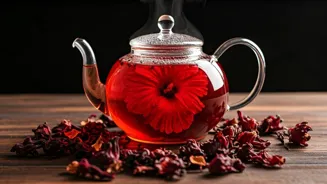Tea’s Beneficial Duo
Hibiscus tea, also known as sour tea or roselle, is celebrated for its vibrant color and potential health benefits. It is prepared from the calyces of
the hibiscus flower and is often enjoyed as a refreshing beverage. It is thought that this tea can improve heart, kidney, and liver health because it has antioxidants. Understanding how to brew this tea can make a big difference in flavor and maximize these benefits. The preparation method significantly influences the concentration of beneficial compounds and the tea's taste profile. The process includes choosing high-quality hibiscus, using the right water temperature, and steeping for the optimal duration.
Perfect Brewing Method
Brewing hibiscus tea requires attention to detail. Start with fresh, dried hibiscus flowers and clean, filtered water. Heat the water until it is nearly boiling, around 200-212°F (93-100°C). Avoid boiling, as this can affect the tea's delicate flavors. Place about 1-2 teaspoons of hibiscus flowers per cup of water in a teapot or infuser. Pour the hot water over the flowers and allow them to steep for 5-10 minutes. The longer the steeping time, the more intense the color and flavor will be. Experiment to find your preferred strength. After steeping, remove the flowers or strain the tea to prevent over-extraction. You can serve the tea hot or chill it for a refreshing iced beverage.
Enhancing Your Brew
Customize your hibiscus tea with various additions to complement its flavor and boost its health properties. Sweeten the tea with honey, agave nectar, or a natural sweetener if desired. Avoid excessive sugar to maintain its health benefits. Experiment with adding spices such as cinnamon, ginger, or cloves for warmth. For a citrusy twist, include a slice of lemon or orange. Fresh herbs, such as mint or lemongrass, also add complexity. Consider adding a pinch of salt to balance the flavors. These additions transform hibiscus tea into a versatile beverage that suits different tastes and purposes.
Heart, Liver Benefits
Hibiscus tea is linked to several health benefits, especially in relation to heart, kidney, and liver health. Studies have shown that regular consumption of hibiscus tea may help lower blood pressure. The antioxidants in the tea can protect the cardiovascular system from damage. Furthermore, hibiscus tea may support kidney function by acting as a gentle diuretic, aiding in detoxification. The liver may also benefit as hibiscus tea contains compounds that support liver health. Regular consumption is linked to reduced liver inflammation and improved overall liver function. To maximize these benefits, brewing and consuming the tea correctly is key.
Quality & Storage
The quality of hibiscus flowers affects the final tea's flavor and benefits. When buying hibiscus, choose flowers that are vibrant in color and free from mold or pests. Store dried hibiscus flowers in an airtight container, away from direct sunlight, heat, and moisture, to preserve their potency. This helps maintain the color, flavor, and health-promoting compounds of the tea. Properly stored hibiscus can last for up to a year. Check the flowers for freshness before each use and be aware of the tea's expiration date. By using high-quality ingredients and proper storage techniques, you can ensure that each cup of hibiscus tea delivers the maximum health benefits.












